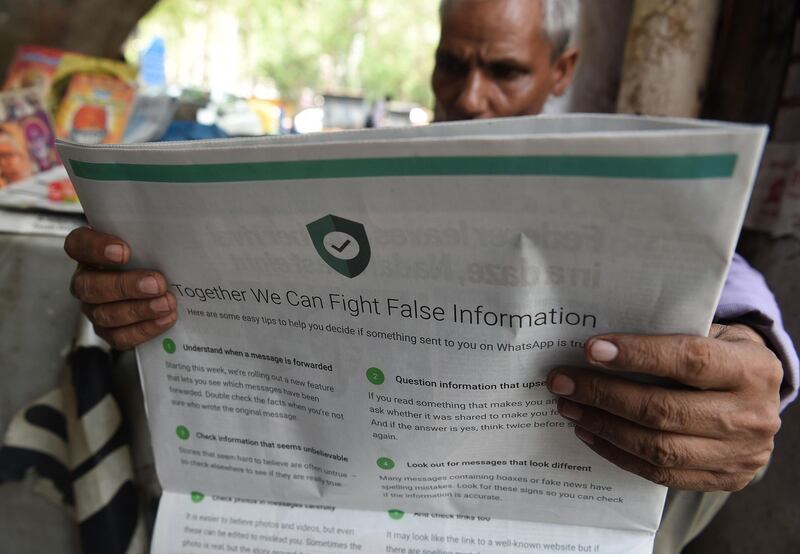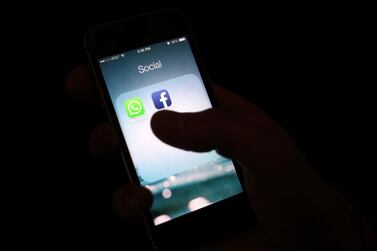Last week, one of Twitter's top executives appeared before a parliamentary panel in New Delhi, which had also summoned Facebook and its subsidiaries WhatsApp and Instagram, to answer how the social media companies are handling the spread of fake news with general elections approaching in India.
The role that social media could play in promoting misinformation that influences how people vote has become a major worry for policymakers.
India is one of the world’s biggest internet markets, and therefore a critical region for growth for the world’s largest social media companies.
“The numbers on social media are just going to rise in India,” says Randal Gomes, the chief creative officer at MindShift Interactive, a digital marketing company in Mumbai.
The surge in internet use in India is driven by a sharp rise in smartphone ownership, which is how most Indians access the web. The number of smartphone users in the country is expected to double to 829 million by 2021, according to American technology giant Cisco. It forecasts that smartphone data consumption in India will increase five-fold by 2022.
“It’s only logical for the Indian government to take precautionary measures as India goes to the polls,” says Nitin Bhatia, the managing director of social media and international markets, at Meltwater India, a social and online media analytics company.
"In the coming months we can see more robust internal monitoring on content being shared over the social media platforms and we could see some real-time changes to policing fake news by these social media giants," he says.
Facebook has 300 million users in India, while messaging service WhatsApp has about 200 million users. India is the largest market for both platforms. Meanwhile, Twitter has more than 30 million users in India. Social media advertising revenues in India this year are expected to increase by more than 37 per cent over the previous year to $3.5 billion, according to Statista, a data website.
“India is the world’s largest democracy, and one of our largest and fastest-growing audience markets in the world, so the 2019 Lok Sabha [election] is a key priority for Twitter,” wrote Colin Crowell, Twitter’s global vice president of public policy, in a blog post.
Mr Crowell was the company executive who appeared before the parliamentary panel. The company was told to engage more with the Election Commission to help ensure fair polls, and it was given 10 days to file responses to the questions it did not have immediate answers to.
Twitter declined to comment when contacted by The National.
The company has already taken some measures to tackle issues it encounters in India. Prior to appearing before the committee, Twitter announced that on March 11 it will bring its ads transparency service to India, which allows anyone to view key details of political adverts including ad spend and the demographics being targeted in the campaign.
“We continue to invest intensively to identify and combat bad-faith actors who try to manipulate the service,” said Mr Crowell.
The company is also conducting workshops with parties including Prime Minister Narendra Modi’s ruling Bharatiya Janata Party to train them on engaging with the public via Twitter, he said.
Concerns about the influence of social media heightened following a series of lynchings in India, triggered by the spread of rumours on WhatsApp that led to dozens of fatal mob attacks on some citizens. These incidents prompted WhatsApp to introduce restrictions on forwarding messages.
For its part, the Indian government wants to introduce regulations that are not popular with social media companies.
At the end of last year, New Delhi proposed a set of rules for platforms which would make it mandatory for companies to remove unlawful content, including material which affects the "sovereignty and integrity of India", within 24 hours. The proposed regulations also stipulate that companies with more than 5 million users set up a local office and appoint a person to co-ordinate with law enforcement at any time of the day.
Global technology companies were already at odds with the government following a draft personal protection bill earlier in 2018, which recommended storing data in India rather than overseas and hefty penalties for those who fall foul of the law. The coming elections are only adding pressure to the issue.
“Calling parliamentary panel meetings with social media heads honestly is a big strategic noise tailor-made to show the public that ‘this is to uphold your democratic rights’,” says Abhik Choudhury, the chief strategist at Salt and Paper Consulting, a brand consultancy in New Delhi.
But he does not believe these issues will ultimately be a hurdle for major social media companies, which already have a strong foothold in the market. "In India, don't expect the numbers of any of the giants to fall because of this," says
Mr Choudhury. "After the huge meltdown [following] US hearings, Facebook's user and ad spend growth rate has only kept increasing."
But India is not alone in worrying about the role of social media in elections.
The European Commission last week said that Facebook, Twitter and Google have failed to provide key data and deliver on their announced measures to crack down on fake news. This news comes ahead of European Union elections in May.
The EC said Facebook had not disclosed details in January of the number of fake accounts targeting the EU it had deleted.
The information from Europe does not bode well for India’s hopes to control these major companies and the impact of fake news in its complex market.
But some analysts say it is imperative that companies adapt quickly in India. "We are already seeing Facebook and Twitter hiring language experts, public policy experts and for many other very specific functions to ensure they are India-ready," says Mr Bhatia.
But that is all still very much a work in progress, he says, citing fake news as the biggest hurdle.
While measures like the EU's General Data Protection Regulation and individual government's efforts to "nab fake news mongers", no such systems are in place to mitigate misinformation in India in any "organised" way.
Meanwhile, some are voicing concerns over the implications of tighter government monitoring of social media.
"It has been observed that internet freedom is declining in India," says Nilesh Sambare, the founder of Jijau Social and Educational Trust. As social media companies consider the reality of "stricter government rules, greater accountability and regulatory scrutiny", the consequences on censorship and privacy is becoming more obvious to social media consumers, he says.
There is a quandary on the one hand of “people needing protection to freely use the internet”, but “the internet also needing monitoring by the government of India to ensure its safe and lawful use”.
With elections only weeks away, new regulations for the social media giants largely depend on who wins at the polls.
“For now, we play the waiting game,” says Mr Gomes of MindShift Interactive.








